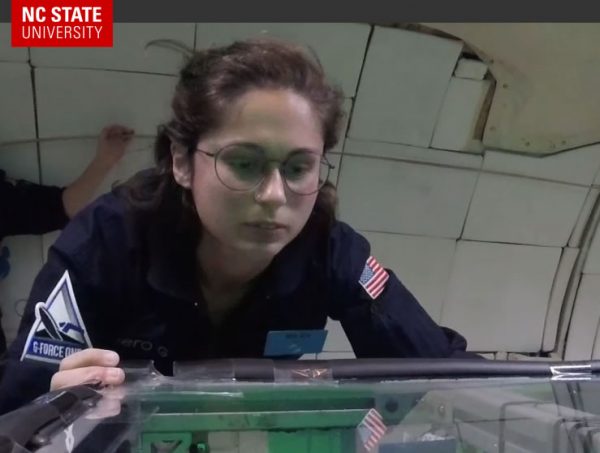Alum Riley Reid is a High Flier

Riley Reid (B.S. ’19) might be the only CBE grad who knows what it’s like to work in zero gravity conditions. In November 2018, Riley and four of her teammates from Dr. Karen Daniels’ research group did that during flights funded by NASA and flown by Zero Gravity Corporation (ZERO-G).
Dr. Daniels, a professor and University Faculty Scholar in the NC State Department of Physics, studies (among other things) granular materials. With Prof. Daniels’ guidance, the team built an apparatus designed to simulate the surface of an asteroid that’s covered with loosely-held granular materials; rocks and dust.
If a robot was sent to the asteroid, the absence of gravity would necessitate anchoring it to the asteroid surface. In 2017, Prof. Daniels received funding from NASA to study an innovative way to do that: the EMPANADA project (Ejecta-Minimizing Protocols for Applications Needing Anchoring or Digging on Asteroids).
According to the NASA press release, “The EMPANADA payload explores new ways of penetrating soil in microgravity by using flexible probes inspired by plant roots driven at very slow speed. This new technology could be used in asteroid mining or anchoring to a low-gravity object.”
Project funding included time on several ZERO-G flights that allowed the team to test the concept with their device under realistic conditions. The flights simulated weightlessness by making roller-coaster-like flight maneuvers in the air, as well as lunar and Martian gravity conditions.
In an article on the NCSU web site, “Granular Experiments in Zero-G,” Riley describes her experience on the flights: “Zero gravity was awesome. There was definitely a bit of sensory overload being in a plane full of shouting researchers and loud experiments and all of a sudden your feet are floating behind your head. I was also surprised by how strong I felt. It was so easy to move around or turn without gravity fighting you. When the flight ended and we were back to feeling normal Earth gravity, I noticed the extra effort I needed to move around, and I missed the zero-gravity strength.”
The other members of the team were undergraduates Robert Bullard, Tristan Emm, and Anna Jackson, and Jonathan Kollmer, a former post-doc in Professor Daniels’ group.
Riley graduated with bachelor’s degrees in chemical engineering (with a minor in nanoscience) and Physics. During her time at NC State she completed a co-op rotation at Shaw Industries, researched systems biology in professor Adriana San-Miguel’s lab, and interned at the NASA Goddard Space Flight Center in the Instrument Systems and Technology Division. She also participated in the Engineering Entrepreneurs Program. She’ll continue her studies in the Aerospace Engineering Sciences Ph.D. Program at the University of Colorado-Boulder, where she’ll be focusing on Remote Sensing, Earth, & Space Science.
Congratulations to Riley for being a high flier!
- Categories: